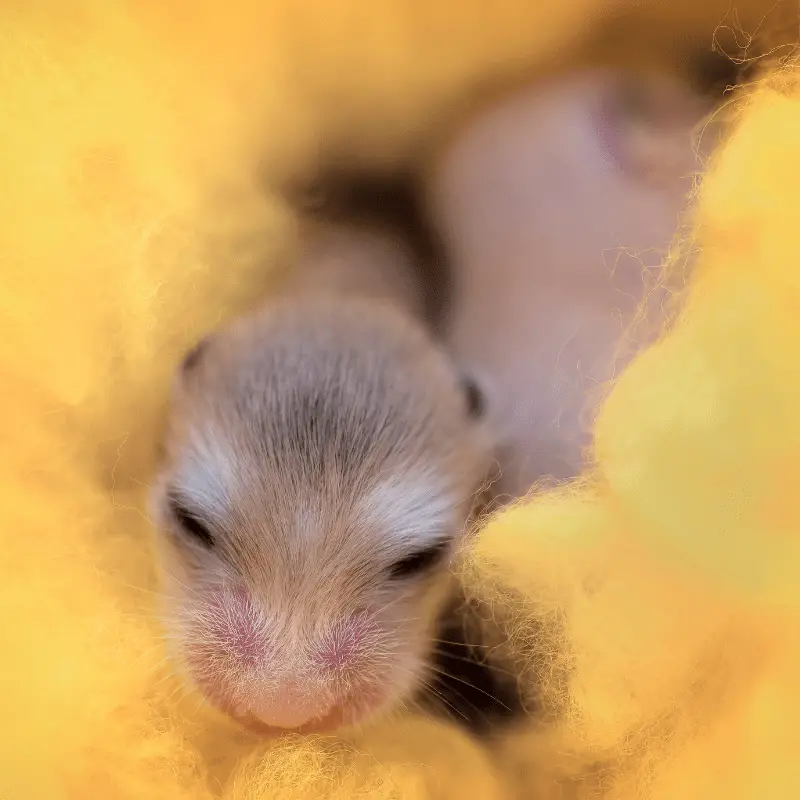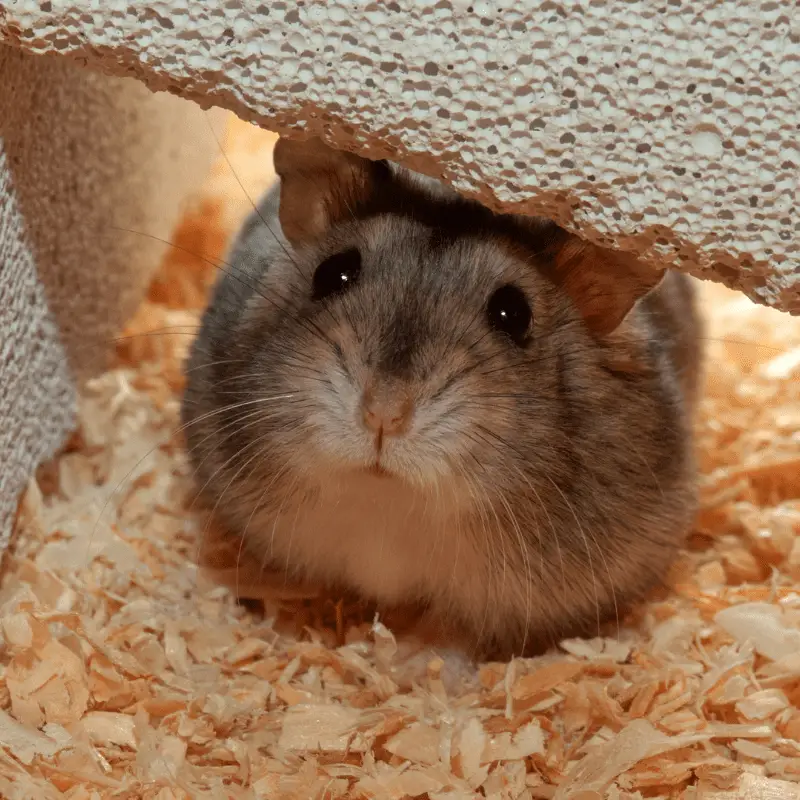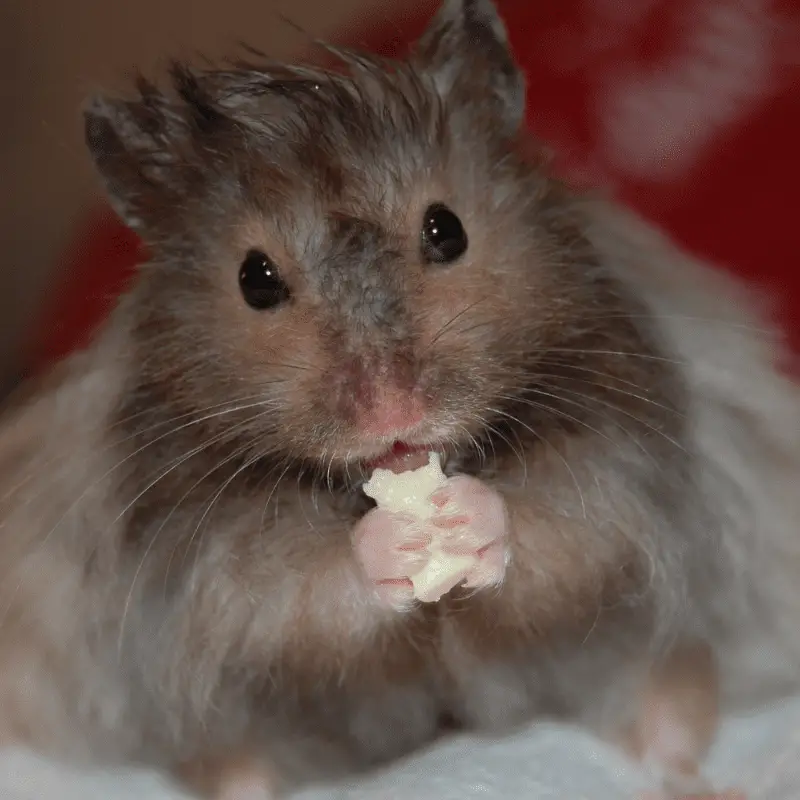There are around 1.8k different cheese varieties worldwide; however, we will concentrate on the most common cheeses found in the supermarkets.
There is hardly anyone who does not love the taste of cheese. However, it is the rodents who have become associated with cheese. Just turn on the television, and you will find animation movies showing you the trick to catch rodents is by using cheese as the bait.
It seems the relationship between the cheese and rodents is undeniable. That’s why it is quite natural to question whether you should offer cheese to your pet hamster. Today we will find out whether the cheese is safe for hamsters and if yes, just how much and of which varieties.
Cheese is a perfectly safe snack for your pet hamster. As it is full of vitamins, proteins and minerals. Cheese can be a healthy snack for your hamster. However, not all of the cheese varieties are safe. You must be cautious about the amount you treat your hamster with, as these delicious treats contain a high amount of calories.
While some cheeses are not harmful to your pet, you should not use it as the primary food source. Always use the complete food mix for hamsters and along with it plenty of water. The cheese should be given only as treats and that too in moderation.
To learn more about safely feeding cheese to your hamster, you should check the following section of this article.
How is cheese safe for hamsters?
As you might have surmised, cheese is perfectly safe for the hamsters. You can feed them mozzarella, cottage cheese, ricotta and mild, plain cheese and low-fat plain cheese. Small portions of cheese are safe for the hamsters, thanks to the fermenting process. This procedure creates the end product that most of the creatures can consume safely. Also, the lactose content is much lower than that of the regular milk. That makes it easier for the hamsters’ gut to process and digest cheese compared to other dairy products efficiently.
Do hamsters like cheese?
Wild hamsters are foragers, and they forage through the areas and eat the food elements they can find. However, cheese is not a product that the wild hamsters have direct access to. They eat worms, seeds, fruits and insects to maintain their intake of protein and fat.
Hamsters are not born with a natural craving and liking for cheese. However, once they taste it, they can develop preferences for it. Remember, just like you, your pet hamster can also have personal preferences for different food items.
When feeding your hamster cheese for the first time
Firstly you need to work out if your hamster likes cheese or not. To start with, you should offer only a tiny slither of cheese. Remember not to give more, as cheese is very rich and has a high amount of calories. Keep an eye on your hamster while it consumes the piece of cheese. If your hamster turns his back to the cheese or keeps his twitchy nose away from the cheese, you’ll know that your hamster isn’t keen on it. Like us, humans hamster don’t like all food. If not interested, make sure to remove it right away to stop it from decomposing in their cage. There is plenty of other treats you can try with your hamster.
Cheese is one of the highly caloric food items. So, you should always keep the size of your hamster in mind before feeding it cheese. Too much cheese is unsafe for your hamster can turn your hamster obese.
What types of cheeses are safe for hamsters:
- Mozzarella
- Cottage cheese
- Ricotta
- Mild, plain cheddar cheese
- Mild, plain low-fat cheese
- Babybel light, original
How much cheese to feed a hamster
You should only offer a tiny of cheese to your hamster every week. As the hamsters are significantly small, the portion size should not be more significant than a raisin.
If you decide to offer cheese to your hamster, you should check the corners of the changes regularly. The hamsters like to store food in the corners of their cages and bury it. So, control the portion and check the corners of the cage to ensure that your hamster is not storing it up and eating more than it actually should in one go.
Amount
- Once a week, the size of a raisin
Can baby hamsters eat cheese?

Do not provide baby hamsters cheese, and this is because their digestive systems are not ready to handle any cheese treats yet, it can be fatal for younger hamsters. A hamster is fully grown at three months old, and you should save the cheese treats for after this time.
Dwarf Hamsters

While all hamsters can eat cheese, dwarf hamsters suffer from a higher risk of developing hamster diabetes. So, if you have a dwarf hamster as your pet, you should be cautious about handing out cheese treats to them, instead of giving a cheese treat once a week extend it to every two weeks for a dwarf hamster.
Cheese varieties to avoid giving your hamster
Best not give some of the cheese varieties to your hamster due to the higher salt and saturated fat thats in them. The list below shows you which cheeses to avoid.
- Parmesan
- Processed cheese
- Cheese squares
- Aged cheese
- Pecorino Romano
- Brie
- Mouldy cheese varieties, stilton, blue cheese
- Cheese with added fruits
- Mascarpone
If you offer these types of cheeses to your pet hamster, it could enhance their blood cholesterol and spike the risk of heart attacks and strokes. These types of cheese can also cause constipation and dehydration in your hamster. Mouldy cheese contains bacteria or mould that is toxic and extremely unsafe for hamsters, so it would be best to avoid these altogether.
Protein is essential for a hamsters diet.
The best diet for regular hamsters should contain 15% – 20% of protein. However, if you have a pregnant hamster, the protein requirement enhances up to 24% to maintain strength. Most of the food mix for hamsters requires other protein-rich food to keep the small animals’ protein intake balanced. While most of the veterinarian or the rodent nutritionists suggest mealworms or boiled eggs as a protein source, cheese can also do. It can also act as one of the best resources for calcium.
How to feed your hamster cheese?
It is entirely up to you. If you wish to treat your hamster with a treat, you can include cheese in the regular weekly meal plans for your hamster, or you can offer it as a reward at the end of a fun game. You could also put little pieces of cheese in paper or cardboard box, and this will create the added excitement as your hamster forages their way to it for some fun.
Overfeeding your hamster cheese
Overfeeding your hamster cheese can lead to many problems. Firstly, cheese contains a lot of dietary cholesterol, saturated fat and sodium. That means if you keep feeding overfeeding your hamster cheese, the chances are their sodium level will rise significantly. It can spike their blood pressure leaving them susceptible to problems like stroke and heart attack. Saturated fat creates yet another problem for the hamsters. Too much saturated fat can enhance the blood cholesterol levels increasing the issues like heart attacks and strokes. As cheese does not contain much fibre, it can cause constipation in your hamster. Now you know the importance of the right amount to provide your hamster with you must stick to it.
A reminder of the amount to feed a hamster
Once a week, cheese treat the size of a raisin and a dwarf hamster every two weeks the size of a raisin.
How to tell if your hamster has eaten to much cheese?
- Lethargic
- Huddling in a corner
- Non-responsive
- Diarrhoea
- Constipation
- Thirst, or not drinking anything
Can hamsters eat other dairy products?
Along with cheese, hamsters can eat a bit of fat-free yoghurt. However, you should not offer unhealthy dairy products, like ice cream, which contains high sugar, fat and calories.
Even though milk is not precisely toxic for the hamsters, you should not give it to them. Different types of milk affect the digestive system of hamsters in different ways. So, milk consumption can lead to diarrhoea and dehydration.
Can hamsters eat cheese puffs?
Hamsters should not eat cheese puffs, and they do not offer any nutritional benefit to your hamster. Cheese puffs contain high sodium levels that can spike your hamster’s blood pressure, considerably enhancing the risk of kidney disease of your hamster, and the chances of heart attacks.
Conclusion
As the wild hamsters can consume animal proteins, your pet can eat a bit of cheese. While it should not become their staple food, cheese can be an acceptable treat. So, if you wish to give a small raisin size of cheese to your hamster as a treat, feel free to do so. Just make sure not to feed junk food to your pet hamster such as cheese puffs. Before introducing your hamster to any new foods, you should consult your veterinarian for the final answer.
Happy hamster parenting!

